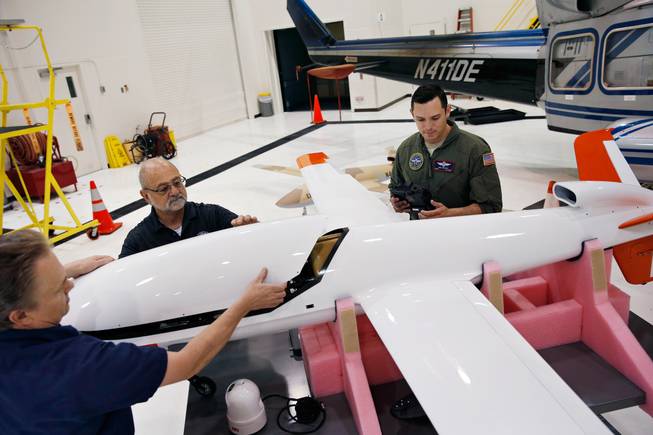
John Locher / AP
From left, Joe Cummings, Mike Lukens and Mike Toland of National Security Technologies, a contractor for the National Nuclear Security Administration, work on a drone May 19, 2016, at the Remote Sensing Laboratory in Las Vegas. Officials from the Nevada National Security Site announced the purchase of two unmanned aerial vehicles as part of a test program to provide arial radiological monitoring in the event of an emergency.
Thursday, July 14, 2016 | 2 a.m.
Legislation approved by Congress on Wednesday extended Nevada’s designation as a federal test site for drone development, but failed to include many aviation-related priorities the delegation had hoped would benefit the state, due to a controversial effort to overhaul air-traffic control operations. The measures fell under legislation to fund the Federal Aviation Administration.
In 2013, the FAA announced that Nevada would serve as one of six test-site operators around the country. Operations at the site were sluggish in the beginning but have expanded, and state officials see opportunities as organizations begin to test large drones (over 55 pounds). They believe Nevada has the workforce to support such tests, given that it is home to the Nevada National Security Site and Creech Air Force Base, where the U.S. government conducts military drone operations.
Under the bill that was just approved, the sunset date for Nevada’s site — originally set for next year — was extended until 2020.
Democratic Rep. Dina Titus, who sits on the House transportation committee and worked on several drone-related provisions, said in a statement that the bill maintains “Nevada as a premier hub of growth for the UAS industry while maintaining the valuable partnership between the FAA and the state.”
Over the past several months, state officials have worked to raise Nevada’s profile as a place to test drones. Reno-headquartered startup Flirtey conducted the first residential drone delivery of first-aid supplies to a small Nevada town of about 3,000 residents in the spring. Chinese company Ehang, which unveiled the first passenger drone at CES in January, said last month that it plans to test its product in Nevada. The governor’s office also announced that Microsoft had been working with the test site to conduct flights.

In this Friday, March 25, 2016, photo provided by Flirtey, an independent drone delivery company, shows the first fully autonomous, FAA-approved urban drone delivery, a box with bottled water, emergency food and a first aid kit in a residential setting without the help of a human to manually steer it in Hawthorne, Nev.
The FAA has liberalized its rules on drone flights — companies will be able to fly small commercial drones by August without special approval — since the test site was created. But many argue that such sites have not outgrown their use, especially when testing traffic management and larger drones.
Tom Wilczek, who oversees the drone test site through the Governor’s Office of Economic Development, said that extending the sunset date by about three more years, will allow the state “to refocus our efforts with the FAA on the integration of large (drone systems) and testing beyond (a pilot’s) line of sight.”
“Both of those elements are important,” he said. “I think they play to our strength.”
The extension also provides more stability when the governor’s office attempts to attract commercial drone development and works with organizations on long-term projects, he said.
“All of Nevada’s congressional delegation was supportive of the test site,” Wilczek added. “They worked very hard to make sure that language was kept in the House and the Senate version.”
Republican Sen. Dean Heller, who sits on the Senate’s subcommittee for transportation, had been working on the bill for months. His office pushed a variety of priorities in original legislation that overwhelmingly passed the Senate earlier this year. The provisions would have helped large airports, like McCarran International Airport, use federal funding for transportation projects and assisted smaller airports with adding more airline routes. It also would have made it easier for mining operations to use drones.
But those provisions were scrapped after a debate about overhauling air-traffic control forced Congress into adopting a short-term funding measure rather than the original, wide-ranging legislation.
“The extension of the six unmanned aircraft systems test sites, including Nevada’s, ensures our state will continue to serve as a leader of innovation for this exciting technology,” Heller said in a statement, after the Senate passed the short-term funding extension Wednesday. "While I wish the House had acted on the more robust Senate-passed bill, this bicameral agreement will serve our Nevada communities well.”
The final legislation also included provisions to address human trafficking, a significant issue in the state. Last year, 133 human-trafficking cases were reported in Nevada, more than double the amount reported in 2012, according to the National Human Trafficking Resource Center. The organization reported that in 2015, Nevada had the 10th highest number of reported cases. The vast majority of these cases involved sex trafficking. The bill requires airlines to train employees to spot potential victims of human trafficking.
“These crimes don’t just happen on the ground and are just as hard to spot in the sky,” Titus said. “Airline-industry employees are in the best position to recognize and report the signs of human trafficking in our skies and can play a key role in stopping the perpetrators of these heinous crimes.”

Join the Discussion:
Check this out for a full explanation of our conversion to the LiveFyre commenting system and instructions on how to sign up for an account.
Full comments policy